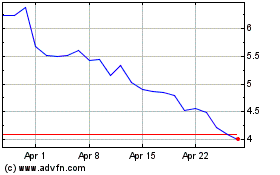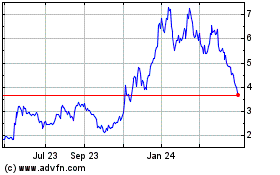Autolus Therapeutics Presents Clinical Data Update at the Society of Hematologic Oncology (SOHO) Annual Meeting 2024
27 August 2024 - 9:00PM

Autolus Therapeutics plc (Nasdaq: AUTL), a clinical-stage
biopharmaceutical company developing next-generation programmed T
cell therapies, announces a poster presentation at the Society of
Hematologic Oncology (SOHO) Annual Meeting being held
September 4-7, 2024 in Houston, Texas. These data demonstrate the
rationale for tumor burden (TB)-guided dosing in adult patients
with Relapsed/Refractory B-Cell Acute Lymphoblastic Leukemia (r/r
B-ALL) by analyzing the impact of bone marrow (BM) blast percentage
prior to lymphodepletion in patients treated with obe-cel in the
FELIX Phase 1b/2 study.
“Unlike other CD19 CAR T-cell therapies, obe-cel
is administered to patients as two infusions using a tumor
burden-guided dosing schedule,” said Dr. Christian Itin,
Chief Executive Officer of Autolus. “The data demonstrate
the importance of administering both split doses of obe-cel to
patients with r/r B-ALL and highlight the differentiation of
obe-cel based on its unique binding properties and tumor
burden-guided dosing approach.”
Poster
presentation: Title: Obecabtagene autoleucel
(obe-cel) for Relapsed/Refractory Adult B-Cell Acute Lymphoblastic
Leukemia (r/r B-ALL): Impact of Chimeric Antigen Receptor T-Cell
(CAR T) and Tumor Burden-Guided Dosing in the FELIX Phase 1b/2
Study
Session date and time: Wednesday, September 4,
6:15 pmSession room: Hall B3Poster
Number: ALL-502Presenting Author:
Dr. Elias Jabbour, Professor, Department of Leukemia, Division of
Cancer Medicine, MD Anderson Cancer Center, Houston, TX
Summary: Tumor burden (TB) is a
recognized driver of immunotoxicity from CAR T therapy for B-ALL.
Obe-cel is a novel autologous CAR T with a differentiated fast
off-rate CD19 binding domain and a 4-1BB co-stimulatory domain,
designed to improve CAR T persistence and immunotoxicity. Obe-cel
is an investigational therapy being evaluated in adult r/r B-ALL in
the FELIX Phase Ib/II study (NCT04404660), utilizing TB-guided
dosing based on bone marrow (BM) blast percentage prior to
lymphodepletion. We report outcomes by TB, demonstrating the
rationale for TB-guided dosing in adult r/r B-ALL.
Of 127 patients infused with obe-cel, 120 (94%)
received the planned two doses (low TB: n=48 [40%]; high TB: n=72
[60%]). Overall, high CAR T expansion was observed, which
progressively increased with TB; a TB increase of 50% was
associated with a 1.754-fold increase in Cmax and a 2.068-fold
increase in AUC0–28days. In both groups, peak expansion was reached
after Dose 2 (low/high TB: Day 15 [6–55]/Day 11 [2–28]),
demonstrating the need for both doses regardless of TB. Overall
remission rate was 90% and 75% in low and high TB groups,
respectively.
In summary, TB-guided dosing was associated with
high CAR-T cell expansion and while providing a manageable adverse
event profile. This supports the TB guided-dosing approach in adult
r/r B-ALL.
About Autolus Therapeutics
plcAutolus is a clinical-stage biopharmaceutical company
developing next-generation, programmed T cell therapies for the
treatment of cancer and autoimmune disease. Using a broad suite of
proprietary and modular T cell programming technologies, Autolus is
engineering precisely targeted, controlled and highly active T cell
therapies that are designed to better recognize target cells, break
down their defense mechanisms and eliminate these cells. Autolus
has a pipeline of product candidates in development for the
treatment of hematological malignancies, solid tumors and
autoimmune diseases. For more information, please visit
www.autolus.com
About
obe-cel (AUTO1)Obecabtagene autoleucel (obe-cel) is a
B-lymphocyte antigen CD19 (CD19) chimeric antigen receptor (CAR) T
cell investigational therapy designed to overcome the limitations
in clinical activity and safety compared to current CD19 CAR T cell
therapies. Obe-cel is designed with a fast target binding
off-rate to minimize excessive activation of the programmed T
cells. In clinical trials of obe-cel, this “fast off-rate” profile
reduced toxicity and T cell exhaustion, resulting in improved
persistence and leading to high levels of durable remissions in
relapsed/refractory (r/r) Adult B-cell Acute Lymphoblastic Leukemia
(B-ALL) patients. The results of the FELIX trial, a pivotal trial
for adult B-ALL, have been submitted and accepted by the FDA with a
PDUFA target action date of November 16, 2024. In the EU a
regulatory submission to the EMA was accepted in April 2024, while
in the UK, an MAA was submitted to MHRA in July 2024. In
collaboration with Autolus’ academic partner, University College
London, obe-cel is currently being evaluated in a Phase 1 clinical
trial for B-cell non-Hodgkin lymphoma (B-NHL).
About obe-cel
FELIX clinical trialAutolus’ Phase 1b/2 clinical
trial of obe-cel enrolled adult patients with r/r B-precursor ALL.
The trial had a Phase 1b component prior to proceeding to the
single arm, Phase 2 clinical trial. The primary endpoint was
overall response rate, and the secondary endpoints included
duration of response, MRD negative complete remission rate and
safety. The trial enrolled over 100 patients across 30 of the
leading academic and non-academic centers in the United
States, United Kingdom and Europe. [NCT04404660]
Forward-Looking StatementsThis
press release contains forward-looking statements within the
meaning of the "safe harbor" provisions of the Private Securities
Litigation Reform Act of 1995. Forward-looking statements are
statements that are not historical facts, and in some cases can be
identified by terms such as "may," "will," "could," "expects,"
"plans," "anticipates," and "believes." These statements include,
but are not limited to, statements regarding Autolus’ development
and commercialization of its product candidates, timing of data
announcements and regulatory submissions, its cash resources and
the market opportunity for obe-cel. Any forward-looking statements
are based on management's current views and assumptions and involve
risks and uncertainties that could cause actual results,
performance, or events to differ materially from those expressed or
implied in such statements. These risks and uncertainties include,
but are not limited to, the risks that Autolus’ preclinical or
clinical programs do not advance or result in approved products on
a timely or cost effective basis or at all; the results of early
clinical trials are not always being predictive of future results;
the cost, timing and results of clinical trials; that many product
candidates do not become approved drugs on a timely or cost
effective basis or at all; the ability to enroll patients in
clinical trials; and possible safety and efficacy concerns. For a
discussion of other risks and uncertainties, and other important
factors, any of which could cause Autolus’ actual results to differ
from those contained in the forward-looking statements, see the
section titled "Risk Factors" in Autolus' Annual Report on Form
10-K filed with the Securities and Exchange Commission, or the SEC,
on March 21, 2024 as well as discussions of potential risks,
uncertainties, and other important factors in Autolus' subsequent
filings with the Securities and Exchange Commission. All
information in this press release is as of the date of the release,
and Autolus undertakes no obligation to publicly update any
forward-looking statement, whether as a result of new information,
future events, or otherwise, except as required by law. You should,
therefore, not rely on these forward-looking statements as
representing Autolus’ views as of any date subsequent to the date
of this press release.
Contact:
Olivia Manser+44 (0) 7780 471
568o.manser@autolus.com
Julia Wilson+44 (0) 7818
430877j.wilson@autolus.com
Susan A. NoonanS.A. Noonan
Communications+1-917-513-5303susan@sanoonan.com
Autolus Therapeutics (NASDAQ:AUTL)
Historical Stock Chart
From Dec 2024 to Jan 2025

Autolus Therapeutics (NASDAQ:AUTL)
Historical Stock Chart
From Jan 2024 to Jan 2025
